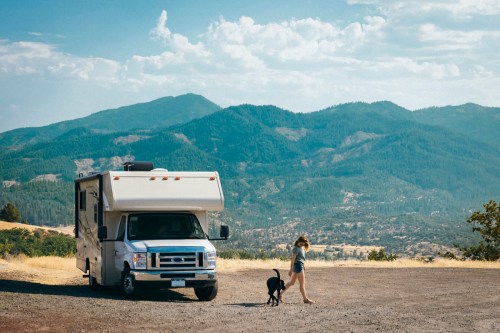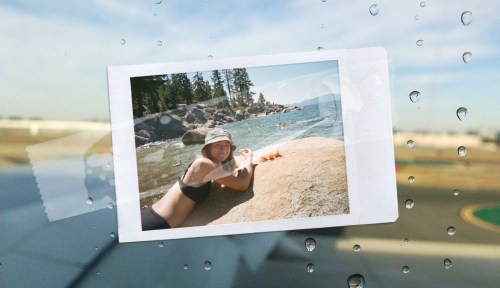Our editors independently select these products. Making a purchase through our links may earn Well+Good a commission
If your complete lack of social plans and events on your calendar in light of quarantining to stop the spread of the coronavirus have inspired a knee-jerk in you to jump in your car and drive…anywhere, I’m right there with you. As a travel writer who is used to being on the go all the time, I was already plotting my RV excursion in April. With lack of clarity about air-travel safety combined with the reality that there’s really nowhere specific you need to go (and likely not much open to do when you get there), taking a drive can feel like a great way to snag the change in scenery while still abiding by necessary pandemic safety precautions.
During times of uncertainty, campers and RVs not only provide a sense of freedom, but a feeling of control over our personal environment, as well—and that stability via constant motion is exactly what I needed. My plan was to drive from Ohio to my Los Angeles-based sister, but it turned out that she and her husband were ahead of me, having already purchased an RV. So our new plan took shape: They would come to Ohio for a couple weeks, then the three of us would drive back to L.A.
The Google search term “RV travel” has been trending on a steep and steady incline since mid-March.
It seems that many folks, along with the three of us, have been seeking refuge in wide open spaces by way of RV travel. The Google search term “RV travel” has been trending on a steep and steady incline since mid-March; The New York Times recently reported that when compared to last year, “Airstream, the retro trailer brand, saw retail sales climb 11 percent”; and National Geographic reports that “RV dealers that reopened in early May report monthly sales are up 170 percent year over year” and “bookings through rental site RVshare for the Fourth of July weekend are up 81 percent over 2019.”
But if you’re new to the van life, you’d be wise to learn a few key RV travel tips before hitting the road. As I discovered firsthand, there’s a lot to learn when it comes to safely towing your own private hotel room across the country, especially in the midst of a pandemic.
Before venturing out on your own overland adventure, keep these 5 RV travel tips in mind:
1. Take safety precautions to prioritize health
Right now especially, taking safety measures to prioritize our own health and the health of others is the prime priority. To that end, make sure your RV is stocked with plenty of masks, gloves and hand sanitizer for when you need to stop for gas or grab food, and keep a first aid kit on hand for any mishaps that may transpire on the road.
Of course, bring plenty of drinking water with you. Many RV-compatible campsites will have water hookups for showering or doing dishes, but you’ll want to ensure the water you drink is from a bottle. I recommend Pathwater, which is an eco-friendly and recyclable alternative to single-use plastic bottles.
2. Don’t be shy to ask for help
Driving an RV or towing a camper, especially for the first time, requires you to learn a lot of new information. Hooking and unhooking to water and electrical outputs, navigating tricky turns and tight spaces, and dumping waste are just a few scenarios where patience, clarity, and a quality two-way radio go a long way. Suffice it to say, if you’re driving with another person or a group of people, there are plenty of opportunities to practice good communications skills.
And don’t feel ashamed to ask for help—while wearing a mask and social distancing, of course. Your fellow road warriors will understand your challenges and will likely be glad to offer assistance.
3. Know thy vehicle
Because RVs are commonly associated with camping, some may assume all of them are equipped to handle any type of outdoor or scenario. In reality though, every RV, camper, or even tricked-out van is different, and knowing the size and weight limitations of your RV or camper ahead of time will save you a lot of time and frustration while out on the road.
When booking a campsite, you’ll need to know that your vehicle will clear any potential obstructions (most often, tree branches), that its length and width will fit the available spots at a campground, and what its weight limits are. My sister, brother-in-law, and I learned our RV’s weight limit the hard way, which led to an unplanned three-day stop in Albuquerque to get a new trailer.
4. Get connected
A number of apps exist to help RVers book and navigate to available campsites while driving cross-country. While KOA—the world’s largest network of privately owned campgrounds—has an app, I found the All Stays app to be more helpful; it offers KOA-site availability as well as Bureau of Land Management locations for boondocking (camping without any hookups) and campsites at state and national parks. Another helpful app is Harvest Hosts, which allows you to book camping spots at wineries, breweries, and farms around the country, many of which, of course, may not be open for upcoming trips.
5. Get the right gear
Plenty of blogs and YouTube channels are dedicated to giving advice on how to pack for a life on the road. Still, having consulted these resources, I have a few additional gear-based RV travel tips to offer. First, coffee: For easy and tasty on-the-go coffee, I recommend Mount Hagan organic fair trade instant coffee and for hassle-free brewed coffee, try Steeped.
I also separate compostable waste from other trash, so having a sealable compost bin (like this one) allowed me to continue that practice on the road without stinking up the small trailer. Finally, pack plenty of extra blankets and towels. Blankets, because you don’t always know what the weather will do; and towels, because you can always count on small spaces getting messy fast.
Sign Up for Our Daily Newsletter
Get all the latest in wellness, trends, food, fitness, beauty, and more delivered right to your inbox.
Got it, you've been added to our email list.











